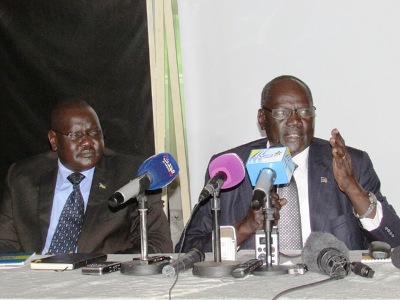S. Sudanese minister warns media against pro-rebel reporting
September 8, 2014 (JUBA) – The government will take punitive measures against journalists giving rebels a voice in South Sudan, information minister Michael Makuei Lueth said on Sunday.

“You are actually disseminating material of the enemy. When you are disseminating material of the rebels in the country, you are actually agitating the people against the government and that has not been happening all over the world,” he said.
Last month, national security agents closed Catholic-owned Bakhita radio, arresting its news editor and three other staff members. The station, however, remained closed, although those arrested were released.
Lueth said the station will only be opened after security agents have completely concluded the ongoing investigations in to the matter.
“This time we will take you (journalists) to the court so that the rest of your colleague will know that you have committed an offence [and] you must be punished according to the law,” said Lueth.
“So if you don’t want us to take you to the court, please stick to the ethics of your profession. We will not touch you, but if you cross the line, there will be no way for us not to take any action against you,” he added.
JOURNALISTS REACT
“The government should tell us what objective writing is or else it is not committed to freedom of press and expression,” said one journalist who preferred anonymity.
The Greater Upper Nile, Bar El Ghazal and Equatoria (GUBET), an indigenous civil society entity, organised the forum under the theme “Role of media in nation building”.
Prof. Abenego Akok Kachuol, the chairperson of South Sudan election commission said the government must also fulfil it duties.
“We want these (media laws) to be brought out such that everybody should not be bully,” said Akok, a former journalist.
Prof. John Akech, a renowned blogger, said government should think of developing community radio stations to counter foreign-funded media that are perceived as hostile by the government.
“If the government can support local newspapers and radio stations from collapse, it will be better than locking horns with the media,” said Akech.
But minister Makuei said some reporters were “intentionally” tainting the image of South Sudan president, Salva Kiir and his government.
“In the course of your dissemination, the information that you pass must be credible, must be reliable, must be responsible and must be accurate. And be ready to account for it,” he said, claiming that some newspapers often quoted him out of context.
South Sudan lacked functional media laws, prior to president Kiir’s decision on Monday to sign into law the long-awaited broadcast bill.
(ST)
